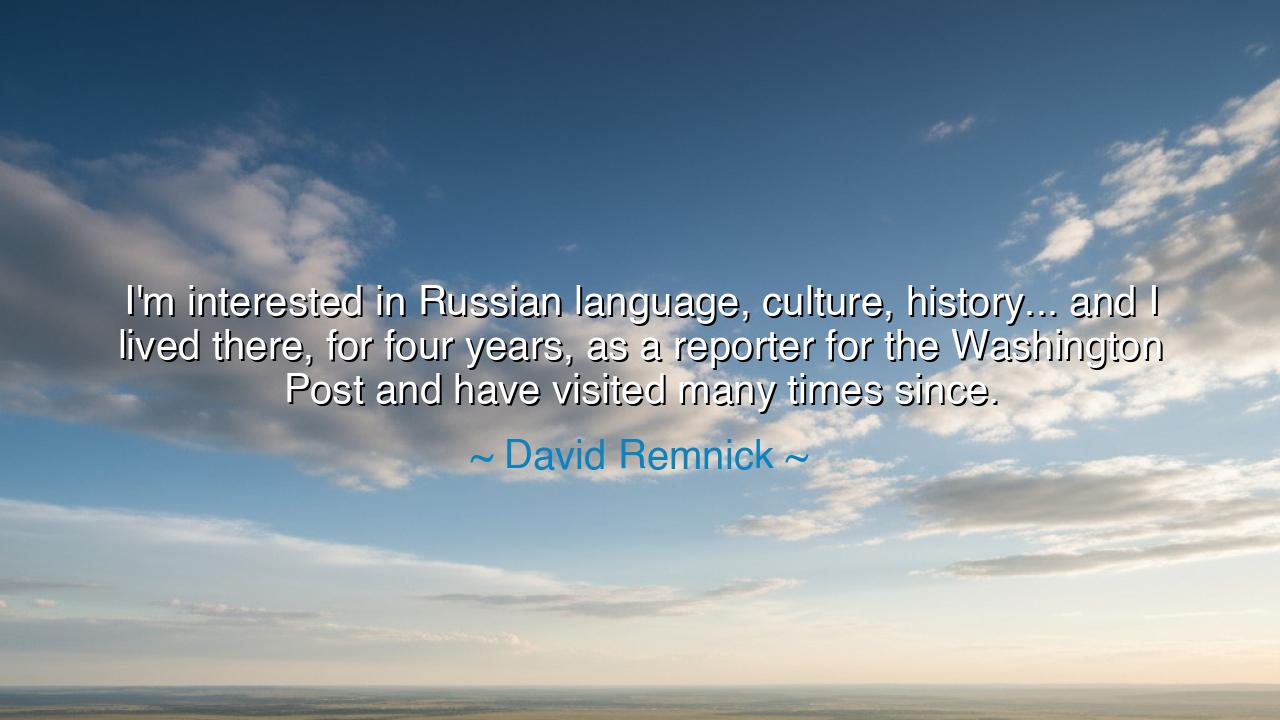
I'm interested in Russian language, culture, history... and I
I'm interested in Russian language, culture, history... and I lived there, for four years, as a reporter for the Washington Post and have visited many times since.






“I’m interested in Russian language, culture, history... and I lived there, for four years, as a reporter for the Washington Post and have visited many times since.” — David Remnick
Hear, O seekers of truth and lovers of understanding, the words of David Remnick, chronicler of nations, editor of minds, and witness to the turning of empires. In this humble yet profound confession, he speaks not of mere curiosity, but of devotion — a deep yearning to understand another people’s language, culture, and history, to see the world not as a stranger, but as one who listens, who learns, who lives among others. In his words lies the eternal calling of the scholar and the journalist: to bridge the gulf between nations, to walk into the heart of another civilization, and to emerge not with judgment, but with wisdom.
The origin of this quote rests in Remnick’s early years as a correspondent in the Soviet Union, during the final days of its long twilight. He went there not as a conqueror nor as a critic, but as a witness — sent by The Washington Post to report on a world that was, even then, trembling on the edge of transformation. Between 1988 and 1992, he lived through the collapse of an empire that had defined the twentieth century. He spoke with citizens and soldiers, artists and bureaucrats, rebels and dreamers. He watched the red flags fall from the Kremlin and the iron chains of ideology dissolve into the uncertainty of a new age. From this experience was born his masterpiece, Lenin’s Tomb: The Last Days of the Soviet Empire, a book that captured not only the death of a political system but the soul of a people in transition.
When Remnick speaks of his interest in language, he speaks of the key to understanding hearts. For to learn another’s tongue is to hear their laughter, their sorrow, their prayers, and their poetry in their own voice. The Russian language, like its land, is vast — capable of thunder and tenderness, of prophecy and despair. In the words of Pushkin and Dostoevsky, in the verses of Akhmatova and the songs of Okudzhava, the Russian spirit reveals its complexity: fierce, melancholic, noble, and enduring. Remnick’s interest was not in the surface of things — the news of the day or the gestures of power — but in the heartbeat beneath history, the ancient rhythm that flows through every people’s art and speech.
To love a nation’s culture is to recognize its humanity even in difference. Remnick, an American, did not romanticize Russia, nor did he condemn it. He sought to understand it. He saw in its people the same longings that fill every human breast — for dignity, for meaning, for belonging. He saw how the Russian history, marked by suffering and resilience, had carved its people into something both tragic and magnificent. From the fires of invasion, revolution, and repression emerged a people who could still create beauty, still dream, still endure. To study such a culture is to learn the alchemy of endurance — how the human soul survives the weight of centuries.
Consider, O listener, how throughout history, those who have crossed borders in pursuit of understanding have illuminated the path of civilization. The Greek historian Herodotus wandered among the Persians to know them not as enemies, but as men. The poet Goethe studied Islam and the East to enrich his own verse. The American writer Langston Hughes traveled to Moscow in the 1930s to witness, with hope and disillusionment alike, the socialist dream. Each of these travelers learned that to know another culture deeply is to know one’s own more truly. Empathy, born of study and experience, is the antidote to ignorance and fear.
Remnick’s words thus teach a lesson beyond journalism or politics. He reminds us that to understand the world, one must first dwell within it — not from a distance, but from within its people, its language, its daily life. The scholar, the artist, the leader — all must become travelers in spirit, stepping beyond comfort into the realm of listening and humility. It is not enough to read about others; one must walk their streets, taste their bread, hear their songs, feel their winters. Only then can one speak truthfully of them.
So let this be your lesson, O child of the global age: become a student of the world. Learn the languages that are not your own; seek the histories that challenge your understanding; honor the cultures that have shaped the shared human story. For in knowing others, you expand the borders of your own soul. As David Remnick teaches through word and example, knowledge is not conquest — it is communion. When you open your heart to another people’s story, you do not lose yourself — you become larger, a citizen not of one land, but of the whole earth.






AAdministratorAdministrator
Welcome, honored guests. Please leave a comment, we will respond soon